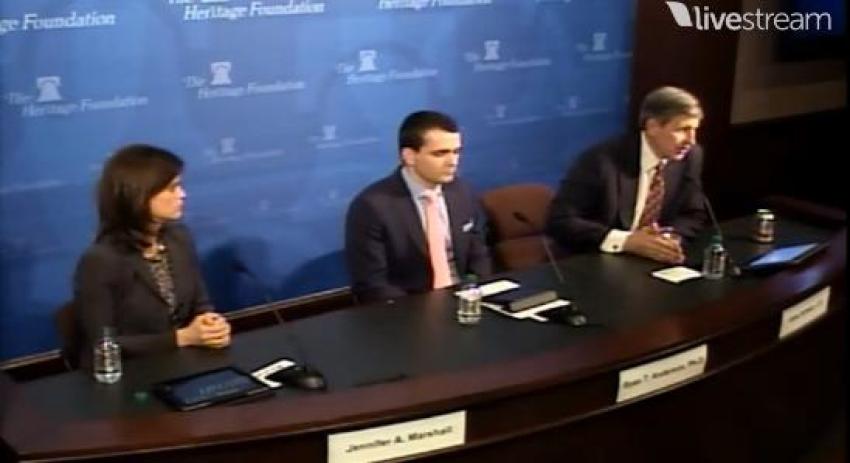Does the Constitution Require Same-Sex Marriage in All 50 States?
As the U.S. Supreme Court prepares to hear oral arguments next Tuesday on whether states will continue to be free to define marriage for their own citizens, a number of amicus briefs have been filed arguing that the U.S. Constitution does not guarantee a fundamental right to same-sex marriage.
Heritage Foundation Senior Fellow Ryan Anderson and prominent attorney and constitutional law expert Gene Schaerr recently co-authored their own amicus brief that asserts that the U.S. Constitution does not require states to redefine marriage to allow for two individuals of the same gender to get married.
Speaking at a Heritage Foundation discussion on Monday, Anderson and Schaerr, a former associate counsel to President George H.W. Bush, explained their brief in detail and offered more reasons as to why the Supreme Court should not force a decision in favor of same-sex marriage on all 50 states to uphold as law.

Anderson, who co-authored the book What is Marriage? Man and Woman: A Defense, explained that governments did not originally get into the "marriage business" because they wanted to be involved in their citizens' romances. Rather, state governments got involved in marriage so that the children who were born from marriages would have the best chance of having a stable family environment to grow up in, which included both a mom and dad.
"There is nothing in the U.S. Constitution that requires all 50 states to redefine marriage," Anderson asserted. "The Constitution is simply silent on whether the consent-based vision of marriage or the comprehensive vision of marriage is the true definition of marriage. It is silent on whether the states should devise their marriage policy to serve."

Schaerr discredited a notion that a person has a constitutional right to get married to the person they love as long as they are two consenting adults.
"The bottom line is … there has never been any right to marry the person you love and so a states' rejection of that claimed right couldn't possibly be a denial of due process under the plain language of the due process clause of the Fourteenth Amendment," Schaerr asserted. "If we turn to the equal protection clause of the Fourteenth Amendment, the argument that same-sex marriage is based on, that clause also has holes in it."
Schaerr also discredited a widely portrayed notion that bans on same-sex marriage are discriminatory against gays and lesbians.
"Unlike the old Jim Crow laws that prohibited mix-raced marriages, the man-woman definition of marriage doesn't offend the equal protection guarantee because it allows any otherwise qualified man and woman to marry, regardless of their sexual orientation," Schaerr said.
"The state man-woman marriage laws do not deny anybody the ability to marry based on their sexual orientation. There is no question on the marriage application that asks are you gay or lesbian," Schaerr continued. "The law doesn't care. The law just says that there are certain requirements for marriage and if you are willing to comply with those requirements, then we will give you a marriage license."
Anderson argues that redefining marriage as a union between two consenting adults would have drastic societal consequences.
"If you redefine marriage to say that it is the union of any two consenting adults, irrespective of sexual complementarity, how will we as a community insist that fathers are essential when the laws redefine marriage to make fathers optional?" Anderson asks. "That is the challenge that faces the society that redefines marriage as consenting-adult romance and care-giving. It eliminates the public message of marriage as about uniting a man and a woman as husband and wife so that children will have both a mom and a dad."
With unelected federal judges overturning a number of states' gay marriage bans in the last year and many people thinking the Supreme Court could do the same a national level, Anderson said that just because the court has the power of judicial review, that does not mean the Supreme Court reigns supreme.
"I think it is important here to say that judicial review is not the same thing as judicial supremacy," Anderson said. "The Supreme Court is not supreme. Judicial supremacy is a problem when it claims to be the only branch of government that has the obligation the defend and uphold the Constitution. All branches of government, the three federal branches and the state governments, take that oath to defend the Constitution. All branches of government are co-equal in interpreting what the Constitution means."
Although many are confident that at least five justices will rule in favor same-sex marriage, Schaerr explained that no Supreme Court justice has ever written an opinion that held that there is a constitutional right for same-sex couples to get married.
"In fact, there are three justices that have written or have joined opinions that clearly say there is no constitutional right to same-sex marriage and Chief Justice Roberts' opinion in the Windsor case goes at least half way there," Schaerr stated. "So as of right now, in terms of Supreme Court Justices, its three-and-a-half on our side and nobody who's committed to recognizing a Constitutional right to same-sex marriage."



























